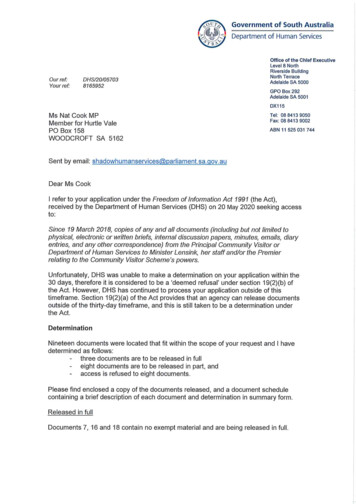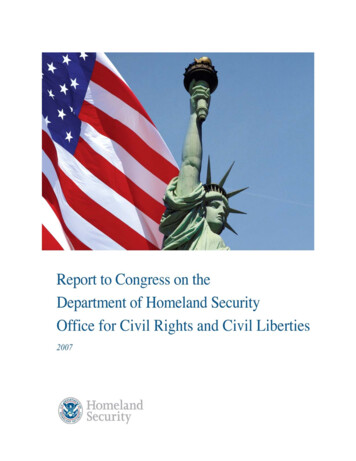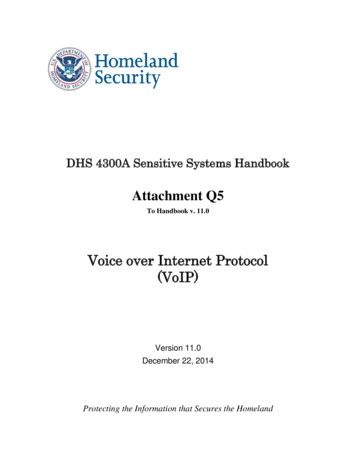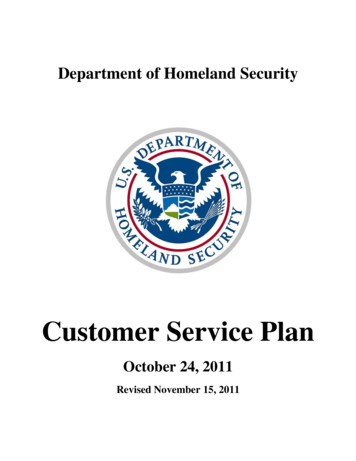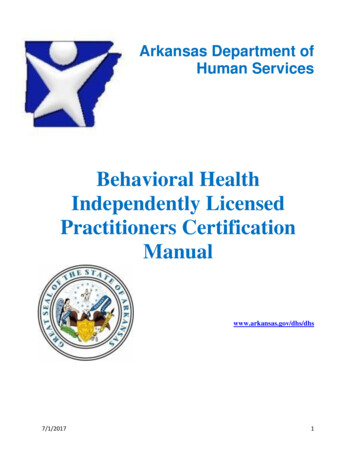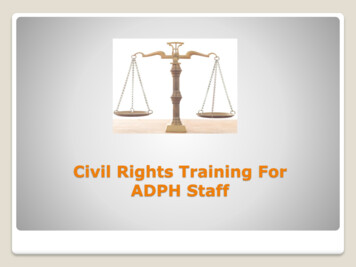
Transcription
Civil Rights Training ForADPH Staff
Welcome to the Civil Rights Review TrainingThis training is required annually for all staffinvolved in the administration of ADPHPrograms2
Chapter I: Civil Rights OverviewADPH receives financial assistance tooperate its programs from several federalagencies, including, but not limited to: The United States Department of Agriculture (USDA),Department of Health and Human Services (HHS),Department of Education (DOE), etc. Because of this financial assistance, these federalagencies also monitor compliance with all civil rightslaws.3
Chapter I: Civil Rights OverviewThis institution is prohibited from discriminating onthe basis of race, color, national origin, disability,age, sex, and in some cases religion, political beliefsor gender identity. * Race - A group of persons related by common decent or heredity. * Color - Pigmentation, complexion, or skin shade or tone. * National Origin - A people having a common origin, tradition, andlanguage. * Disability - A physical or mental impairment that substantially limitsone or more of an individual’s major life activities, having arecord of such impairment, or being regarded as having such animpairment.*Applies to WIC4
Chapter I: Civil Rights Overview * Age - The length of time that one has existed; duration of life;for example, 21 years of age. * Sex - Either of two divisions of organisms distinguishedrespectively as male or female. Religion - A particular system of faith and worship. Political Beliefs – political ideology is certain set of ethical ideals,principles, doctrines, myths, or symbols of a social movement,institution class and/or large group that explains how societyshould work, and offers some political and cultural blueprint fora certain social order. Gender Identity - An individual's internal sense of gender, whichmay be male, female, neither, or a combination of male andfemale.*Applies to WIC5
Chapter I: Civil Rights OverviewThis means that because ADPH receivesfederal funds to operate its programs, wecannot, on the basis of any protected class,do any of the following: Deny services, financial aid, or other benefits; Provide different services, financial aid, or other benefits, orprovide them differently from those provided to others in theprogram; Segregate or treat individuals separately in any way in theirreceipt of any service, financial aid, or benefit; or Retaliate against any person for prior civil rights activity.6
Chapter I: Civil Rights OverviewAlthough the civil rights laws onlyprovide protection for the specifiedprotected classes, it is the policy ofADPH to provide fair and equitabletreatment to every applicant and client! Client patient customer participant Applicant individual applying for services7
Chapter I: Civil Rights OverviewSo what does this mean for ADPHstaff? It means that ADPH is in the business of aiding those inneed of assistance. That’s what we do! We strive to provide benefits in an equitable manner anddo not limit or alter our services based upon race, color,national origin, disability, age, sex, and in some casesreligion, political beliefs or gender identity.8
Chapter I: Civil Rights OverviewRequirements 3WE MUST: Comply with civil rights regulations. Train staff annually. Train all new employees. Provide free communication assistance. Have a compliance officer. Provide a process on how to deal with civil rightscomplaints.9
Chapter I: Civil Rights OverviewAll state and local agencies must complywith USDA regulations on nondiscrimination and the followingrequirements when training their staff: Collection and use of data.Effective public notification systems.Complaint procedures.Compliance review techniques.Resolution of noncompliance.Reasonable modifications in policies, practices andprocedures for persons with disabilities.Requirements for language assistance.Client service.10
Chapter I: Civil Rights OverviewExamples of Illegal Discrimination Denying benefits or opportunities to participate in departmentprograms. Providing different services/benefits. Providing services/benefits in a different manner or in asegregated environment. Restricting privileges. Using policies/procedures that have the effect ofdiscriminating. Retaliation for prior civil rights activity.11
Chapter I: Civil Rights OverviewFor additional information on civil rightslaws and regulations, contact the followingfederal agencies:USDA-Food and Nutrition Service (FNS)Civil Rights Office, Southeast Region61 Forsyth St. S.W., Room 8T36, Atlanta, GA 30303-8909(404) 562-7033 (voice), (404) 562-4517 (fax)U.S. Department of Health and Human ServicesSam Nunn Atlanta Federal Center, Suite 16T7061 Forsyth Street, S.W. Atlanta, GA 30303-89091-800-368-1019 (voice)U.S. Department of Education, Atlanta Office, Office of CivilRights, 61 Forsyth St. S.W., Suite 19T70 Atlanta, GA. 30303-31041-800-421-3481 (voice), 1-877-521-2172 (TDD)U. S. Department of Justice950 Pennsylvania Avenue, NWCivil Rights DivisionDisability Rights Section – 1425 NYAVWashington, D.C. 205301-202-307-0663 (voice)12
Chapter II: Section 1557Requirements forSection 1557 of theAffordable Care Act13
Chapter II: Section 1557What is Section 1557? Section 1557 is the nondiscrimination provision of theAffordable Care Act (ACA). Section 1557 is important to achieving the ACA’s goals ofexpanding access to health care and coverage, eliminatingbarriers, and reducing health disparities. Section 1557 prohibits discrimination on the basis ofrace, color, national origin, sex, age, or disability incertain health programs and activities. Section 1557 builds upon longstanding nondiscriminationlaws and provides new civil rights protections.14
Chapter II: Section 1557What are some of the notable provisions of Section 1557? Section 1557 is the FIRST Federal civil rights law to broadlyprohibit sex discrimination in health programs and activities. Sex discrimination includes, but is not limited to, discriminationbased on an individual’s sex, including pregnancy, relatedmedical conditions, termination of pregnancy, gender identityand sex stereotypes. Gender identity means an individual's internal sense ofgender, which may be male, female, neither, or acombination of male and female. Sex stereotypes means stereotypical notions ofmasculinity or femininity.Section 1557 applies to ADPH.15
Chapter II: Section 1557Who must comply with HHS’s Section1557 regulation? All health programs and activities that receive Federalfinancial assistance from HHS. Examples of types of covered entities: hospitals,health clinics, physicians’ practices, communityhealth centers, nursing homes, rehabilitation centers,health insurance issuers, State Medicaid agencies, etc. Federal financial assistance includes grants, property,Medicaid, Medicare Parts A, C and D payments,and tax credits and cost-sharing subsidies underTitle I of the ACA. (Medicare Part B is not included.) All health programs and activities administered by entitiescreated under Title I of the ACA (i.e., State-based andFederally-facilitated Health Insurance Marketplaces).16
Chapter II: Section 1557Who must comply with HHS’s Section1557 regulation? (cont) All health programs and activities administered by HHS(e.g., Medicare Program, Federally-facilitatedMarketplaces). Where an entity is principally engaged in health services orhealth coverage, ALL of the entity’s operations areconsidered part of the health program or activity, and mustbe in compliance with Section 1557 (e.g., a hospital’smedical departments, as well as its cafeteria and giftshop). The rule does not apply to employment practices such ashiring or firing, except that covered employers areresponsible for their employee health benefit programs incertain circumstances.17
Chapter II: Section 1557Federal Enforcement The U.S. Department of Health and Human Services(HHS), Office for Civil Rights (OCR) enforces Section 1557as to programs that receive funding from HHS. OCR is a neutral, fact-finding agency that receives,investigates and resolves thousands of complaints from thepublic alleging discrimination in health services and healthcoverage. When OCR finds violations, a covered entity will berequired to take corrective actions, which may includerevising policies and procedures, and implementingtraining and monitoring programs. Covered entities mayalso be required to pay compensatory damages.18
Chapter II: Section 1557Federal Enforcement (cont) When a covered entity refuses to take corrective actions,OCR may undertake proceedings to suspend or terminateFederal financial assistance from HHS. OCR may also referthe matter to the U.S. Department of Justice for possibleenforcement proceedings. Section 1557 also provides individuals the right to suecovered entities in court for discrimination if the program oractivity receives Federal financial assistance from HHS or isa State-based Marketplace .19
Chapter III: Collection and Use of DataCollection and Use of Data20
Chapter III: Collection and Use of DataA very important part of programadministration is the collection andreporting of data. This is necessary to: Determine how effectively theprograms are reaching potentiallyeligible persons and beneficiaries. Identify areas where additionaloutreach is needed. Assist in the selection of locations forcompliance reviews. Complete reports, as required.21
Chapter III: Collection and Use of DataWe are required to obtain data byethnic and race category on potentially eligiblepopulations, applicants, and clients inprogram service areas Systems for collecting actual ethnic and racial data mustbe established and maintained for all programs. Ask all program applicants and clients to identify allracial categories that apply. Self-identification or self-reporting is the preferredmethod of obtaining data. Staff must collect ethnicity data first.22
Chapter III: Collection and Use of Data Respect for individual dignity should guide the methods andprocess of collecting data and ethnicity. Ideally, respondent self-identification should be facilitated tothe greatest extent possible. Inform individuals that “This information is requested solely for the purpose ofdetermining the state’s compliance with Federal civil rightslaws and your response will not affect consideration of yourapplication, and may be protected by the Privacy Act. Byproviding this information, you will assist us in assuring thatthis program is administered in a nondiscriminatory manner.If you do not self-identify your ethnicity and/or race, staffwill make a visual observation. Also, provision of race andethnicity data is voluntary.”23
Chapter III: Collection and Use of DataFinally, the data collection system mustensure that data collected aboutapplicants/clients is: Collected and retained by the service delivery point for eachprogram as specified in program regulations, instructions,policies, and guidelines. Based on documented records and maintained for 3 years.* Maintained under safeguards that restrict access of recordsonly to authorized personnel. Submitted as requested to federal agencies.*See your WIC Coordinator for retention of WIC records.24
Chapter IV: Effective Public Notification SystemsEffective Public Notification Systems25
Chapter IV: Effective Public Notification SystemsAll ADPH programs must include a publicnotification system The purpose of this system is to inform applicants,clients, and potentially eligible persons of: Program availability, rights, and responsibilities. The policy of nondiscrimination. The procedure for filing a complaint.26
Chapter IV: Effective Public Notification SystemsThree Elements of Public Notification1.Program Availability: Inform applicants, clients, and potentiallyeligible persons of their program rights and responsibilities and thesteps necessary for participation.2.Complaint Information: Advise applicants and clients at the servicedelivery point of their right to file a complaint, how to file acomplaint, and the complaint procedures.3.Nondiscrimination Statement: All information materials andsources, including websites, used by ADPH, or other subrecipientsto inform the public about department programs must contain anondiscrimination statement. The statement is not required to beincluded on every page of the program website. At a minimum,the nondiscrimination statement, or a link, must be included on thehome page of the program information.27
Chapter IV: Effective Public Notification SystemsMethods of Public Notification Prominently display the “And Justice for All” and Limited English Proficiency(LEP)/Civil Rights Coordinator (CRC) poster. Post notices offering free auxiliary aids and services for individuals withdisabilities. Post notices offering free language assistance services for LEP persons. Inform potentially eligible persons, applicants, clients, and grassrootsorganizations of programs or changes in programs. Provide appropriate information in alternative formats for persons withdisabilities and vital information must be translated into frequently encounteredlanguages spoken by individuals with LEP in local service areas. Include the required, applicable nondiscrimination statement(s) (located onslides 69-75) on all appropriate ADPH publications, websites, posters, andinformational materials. Convey the message of equal opportunity in all photos and other graphics thatare used to provide program or program-related information.28
Chapter V: Accommodation of Persons with DisabilitiesReasonable Modifications in Policies,Practices and Procedures for Persons withDisabilities29
Chapter V: Accommodation of Persons with DisabilitiesReasonable Modifications in Policies,Practices, and Procedures for Persons withDisabilitiesADPH may not discriminate against any qualified individualwith a disability in providing services or administering any program oractivity, whether or not the program receives federal financialassistance. In general, an individual with a disability is “qualified” ifthat person meets the essential eligibility requirements for receipt ofservices or participation in the program or activity. ADPH may notrefuse to allow a person with a disability to participate because theperson has a disability. It may be necessary to make reasonablemodifications to allow participation. ADPH may not harass aprogram participant or applicant based on a disability.30
Chapter V: Accommodation of Persons with DisabilitiesReasonable Modifications in Policies,Practices and Procedures for Persons withDisabilities It is the policy of ADPH to ensure effective communication with individualswith disabilities in our programs, services, and activities, consistent with therequirements of Title II of the Americans with Disability Act (ADA). ADPH will offer free communication assistance to all clients at eachvisit and will give primary consideration to the auxiliary aid or servicerequested by the client. Documents assistance received are located in thepatient’s record. Contract with interpreters (sign language) - Alabama Institute for the Deafand Blind (AIDB) See Title II ADA Effective Communication Policy(Policy # 2019-006)31
Chapter VI: Requirements for Language AssistanceRequirements for Language Assistance32
Chapter VI: Requirements for Language AssistanceRequirements for Language Assistance LEP and language access issues are connected to theCivil Rights Act through a 1974 Supreme Court decision,which found that the Title VI of the Civil Rights Act of1964 also prohibits discrimination on the basis of race,color, and national origin and is the connection betweenlanguage access for limited English proficient individualsand national origin discrimination. Guidance on how toconduct periodic self-assessments of languageassistance needs and available resources can be foundwithin the USDA LEP Policy Guidance.33
Chapter VI: Requirements for Language AssistanceRequirements for Language Assistance To ensure ADPH is meeting these requirements, wehave adopted some basic elements of practice thatassure meaningful language access to LEP persons.These are: Notification - Clients must be notified in their primarylanguage that interpretation and translation services areavailable at no charge to them. This is done through interaction with the client; posters that listvarious languages are visible and staff members have beenassigned to assist LEP clients in offices throughout the state. Do not assume by appearances alone that someone willneed to use these services as this can be seen as offensive. Offer free communication assistance to all clients at each visit.34
Chapter VI: Requirements for Language Assistance Cost - Interpreter and/or translation services must be providedat no cost to the client. Timeliness - Services must be provided to meet the languageaccess needs of the client, but without unreasonable delay. Competence - Not all bilingual persons have the vocabulary orthe ability to interpret in and out of English in every context.Interpreters should have some qualification of competence inthe language they are interpreting. Documentation - Efforts to comply with LEP policies need to befully documented in the client’s record. Confidentiality - The use of interpreters or translators must stillprovide the same level of confidentiality afforded to Englishspeaking clients.35
Chapter VI: Requirements for Language AssistanceRequirements for Language AssistanceIMPORTANT:ADPH staff (including staff of contract vendors) shall notrequire or suggest that clients with limited Englishproficiency use friends, children, or family members asinterpreters because this could compromise serviceeffectiveness and result in breach of confidentiality.However, if the person with limited English proficiencydeclines free service and asks to use an adult relative orfriend, staff must document in the client's file that the offerwas declined. A qualified interpreter may sit in on theinterview at the provider’s discretion. Children are not tobe used as interpreters.See the ADPH Interpreter/Translator Policy # 2019-007and form.36
Chapter VI: Requirements for Language AssistanceServices ADPH uses for LanguageAssistance Language Line (24/7)/1-888-338-7394 Language identification poster or card37
Chapter VI: Requirements for Language AssistanceServices ADPH uses for Language Assistance1. Make or Answer a call2. Press the “More” soft key followed by the“Confrn” soft key.3. Dial, 1-888-338-7394, to add to theconference call.4. Enter the Account Number, 20943, followed bythe # sign.5. Select 1 for SpanishSelect 2 for RussianSelect 3 for VietnameseSelect 4 for SomaliSelect 9 for other6. Enter County Number (County Code),followed by # sign.7. Enter Employee Extension (Last 4 Digits ofPhone Number), followed by the # sign.8. When the caller answers, press “Confrn” to addthem to theconference.9. Press “Hold” to place the conferenceon hold.10. Press “EndCall” to remove yourselffrom the conference. The two othercallers will remain connected.38
Chapter VII: Complaints of DiscriminationComplaints of Discrimination39
Chapter VII: Complaints of DiscriminationComplaints of Discrimination All complaints alleging discrimination on the basis ofrace, color, national origin, disability, age, sex, and insome cases religion, political beliefs or gender identitymust be processed within the time frames establishedby ADPH regulations and agreements.40
Chapter VII: Complaints of DiscriminationComplaints of Discrimination Right to File: Any person or representative alleging discriminationbased upon a prohibitive basis has the right to file acomplaint within 180 days of the allegeddiscriminatory act. The Federal agencies havediscretion to waive the 180 day rule for filing acomplaint in certain circumstances.41
Chapter VII: Complaints of DiscriminationComplaints of Discrimination Acceptance: Civil Rights complaints regarding the AL WIC Programshould be processed in accordance with the WICProcedure Manual; FNS Instruction 113-1; and theFNS State Agency Complaints Processing MOU. All other program complaints, written or verbal need tobe forwarded to the ADPH CRC located in theEmployee Relations Office. Anonymous complaints will be handled the same asothers to the extent feasible.42
Chapter VII: Complaints of DiscriminationComplaints of Discrimination All Complaints: In the event of a verbal complaint and the complainant refusesor is not inclined to place the allegation in writing, the personto whom the allegations are made must write up the elementsof the complaint. Every effort should be made to have the complainant providethe following information: Name, address, and phone number of the complainant. Location and name of the agency providing the services. Nature of the incident that led the complainant to feeldiscrimination was a factor.43
Chapter VII: Complaints of DiscriminationComplaints of Discrimination All Complaints (cont): The basis on which the complainant feelsdiscrimination exists. The names, phone numbers, titles, and businessand personal addresses of persons who may haveknowledge of the alleged discriminatory action. The date the action occurred.44
Chapter VII: Complaints of DiscriminationOnce the Complaint is Received ADPH CRC will review it and notify the complainant in writingor email within 30 days, regarding whether the CRC has theauthority to investigate. ADPH CRC will notify the complainant of the outcome of theinvestigation within 60 days of the date the investigationbegan. ADPH will refer WIC complaints to FNS CRD for processingwithin five (5) calendar days of receipt of the complaint andwill forward all WIC complaints alleging discrimination on thebasis of age, regardless of whether other basis are alleged,to FNS CRD within five (5) working days after receipt.45
Chapter VIII: Conflict ResolutionConflict Resolution46
Chapter VIII: Conflict ResolutionConflict Resolution Conflict resolution means a process ofresolving dispute or disagreement. It mainly aimsat reconciling opposing arguments in a mannerthat promotes and protects the human rights of allparties concerned.47
Chapter VIII: Conflict ResolutionConflict ResolutionHow should you resolve conflict?There are seven steps to successfully negotiating theresolution of a conflict: Understand the conflict Communicate with the opposition Brainstorm possible resolutions Choose the best resolution Use a third party mediator Explore alternatives Cope with stressful situations and pressure tactics48
Chapter IX: Customer ServiceCustomer Service49
Chapter IX: Customer ServiceCustomer Service While civil rights issues are a matter of law, ADPH is inthe business of serving people and meeting their needs. The foundational elements of civil rights legislationshould be reflected in every contact we have with thepublic.50
Chapter IX: Customer ServiceCustomer Service These foundational elements are the basis of our clientservice: All people deserve respect. All people are entitled to fairness and equity in thedelivery of our services and benefits. Personal judgments or feelings regarding race, color,national origin, disabilities, age, sex, and in somecases religion, political beliefs or gender identity haveno place in the determination of how we serve peopleand the benefits we provide.51
Chapter IX: Customer ServiceCustomer Service In addition to these foundational elements, client servicehas some basic best practices that need to be part ofevery client interaction. These are: Prompt attention Willingness to assist Respectful address Active listening Personal accountability Fairness Conflict Resolution52
Chapter IX: Customer ServiceCustomer Service Prompt Attention This is the way we all want to be received. Whether we have a setappointment or arrive at a business (store, restaurant, or office)unannounced, we want our presence acknowledged and promptservices. At ADPH, we know we often cannot serve clients as soon as theywalk in as we are serving other clients. Yet, nothing prevents us fromtaking a moment to acknowledge a client’s arrival and to give them anestimate of the expected wait time. By doing this, we let the client know we are aware of their presenceand provide them with the option of waiting or scheduling a time thatwould work better for them. This action respects the client’s time and decision-making capacityand lets them know they matter.53
Chapter IX: Customer ServiceCustomer Service Willingness to Assist Have you ever been to a business and felt as if you were more of anintrusion to them than a valued client? How did you feel? Many people who visit our offices would prefer not to be there at all. Should we not extend to them a feeling that we are there for themand willing to help? This is as simple as asking, “What can we do for you today?” or “Howcan I help you?” Even if the client is in the wrong place or does not qualify for ourservices, we can always make referrals or find other ways to servesomeone. It’s a simple thing that can make a big difference in someone’s life.54
Chapter IX: Customer ServiceCustomer Service Respectful Address This is simple. How difficult is it to say “Sir” or “Ma’am”? It is aneasy thing to do and conveys respect to those you address. This extends to using someone’s name as well. Unless you’veasked permission to address someone by their first name, usetheir last name (Mr. Smith, Ms. Smith) when you address them.Again, this is a simple thing that we often overlook.55
Chapter IX: Customer ServiceCustomer Service Active Listening We’ve all heard this term, but what does it mean? Active listening requires that we: Allow the speaker to express their complete thought withoutinterruption. Eliminate distractions. Lean forward and make eye contact. Paraphrase to ensure understanding. Avoid rehearsing what you will say when the other person is speaking.56
Chapter IX: Customer ServiceCustomer Service When active listening is ignored we can easily makefalse assumptions, form prejudgments, and makedecisions based upon incorrect information. Active listening can best be described as gettinginvolved in what the other person is saying.57
Chapter IX: Customer ServiceCustomer Service Personal Accountability This is a simple principle, if you say you are going to dosomething, do it. Your word is your commitment. If you promise tocall someone back, make that call. If you say you will work theircase in a certain amount of time, be sure that you are able to dothat. If you cannot, make sure you let the client know there will bea delay and the reason for the delay. Much of what we do is built upon trust. We trust that our client willfollow through with our expectations of them but, moreimportantly, we must build trust by ensuring we do what we saywe will do.58
Chapter IX: Customer ServiceCustomer Service Fairness And finally, the primary piece of the puzzle is fairness. All anyonecan ask is that they receive fair and equitable treatment. No onewants to feel they are being treated differently for any reason.While fairness is well founded and supported in civil rights law, it,most importantly, should be the cornerstone of our treatment ofeveryone.59
Chapter X: Compliance ReviewsCOMPLIANCE REVIEWS60
Chapter X: Compliance ReviewsCOMPLIANCE REVIEWS The civil rights compliance review is a component of themanagement evaluation review process that isconducted on an on-going basis for all ADPH programs. The civil rights review examines ADPH’s activities todetermine that all programs are being administered incompliance with civil rights requirements.61
Chapter X: Compliance ReviewsCOMPLIANCE REVIEWS Some indicators of possible civil rightsconcerns: Unusual fluctuation in the participation of racial orethnic groups in a service area. The number of discrimination complaints filed in aclinic. Information from sources outside of the local agency. Unresolved findings from previous civil rights reviews.62
Chapter XI: Resolution of NoncomplianceRESOLUTION OF NONCOMPLIANCE63
Chapter XI: Resolution of NoncomplianceRESOLUTION OF NONCOMPLIANCE Definition of “Noncompliance” A factual finding that any civil rights requirement,as provided by law, regulation, policy, instruction,or guidelines, is not being adhered to by a stateagency, local agency, or other subrecipient.64
Chapter XI: Resolution of NoncomplianceRESOLUTION OF NONCOMPLIANCE A finding of noncompliance may be the result of: A management evaluation or a civil rights compliancereview; A special review; or An investigation.Note: For WIC, see WIC Procedure Manual, QualityAssurance Chapter.65
Chapter XI: Resolution of NoncomplianceWhat are some examples of noncompliance? Denying an individual or household the opportunity toapply for program benefits or services on the basis of aprotected class. Providing FNS (Food and Nutrition Service) programservices or benefits in a discriminatory manner on thebasis of a protected class.66
Chapter XI: Resolution of NoncomplianceImmigration StatusPrograms that require verification of citizenship: SCHIP- State Child Health Insurance Program Medicaid & Medicare Family Assistance (Formerly known as TANF) Verification is accomplished by using the Systematic AlienVerification for Entitlements Program (SAVE).67
ADPH Policies Civil Rights Plan – Policy #2019-005 Compliance with Title VI of the Civil Rights Act of 1964 –Policy #2019-009 Collecting and Reporting Racial/Ethnic Health Data – Policy #2019-008 Interpreter/Translator Policy #2019-007 Title II ADA Effective Communication PolicyPolicy #2019-006 “USDA Guidance to Federal Financial Assistance Recipients Regarding theTitle VI Prohibition Against National Origin Discrimination AffectingPer
Affordable Care Act (ACA). Section 1557 is important to achieving the ACA's goals of expanding access to health care and coverage, eliminating barriers, and reducing health disparities. Section 1557 prohibits discrimination on the basis of race, color, national origin, sex, age, or disability in certain health programs and activities.

